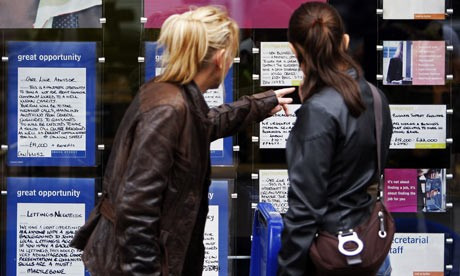UK Employment Rate Hits Highest Since April 2009

Britain's employment rate soared to its highest level since April 2009 in the three months from May to July, as the country's labour market remains robust in spite of the country's longest double-dip recession since World War Two.
The employment rate for those aged from 16 to 64 was 71.2 percent, up 0.5 percent on the quarter, said the Office for National Statistics (ONS), taking the number to 29.56m people employed.
UK unemployment was 8.1 per cent of the economically active population, down 0.1 percent on the quarter. There were 2.59 million unemployed people, down 7,000 on the quarter.
Job Seeker's Allowance claimants dropped by 15,000 from July to August.
Earnings continue to be outpaced by inflation as wage growth was 1.5 percent in the three months to July, down from the quarter to June's 1.8 percent.
People are also working longer, as total hours worked per week hit 934.9m in the three months to July, up 4.5m from the previous quarter and an increase of 14.3m on the year before.
Public sector employment was 5.66m in June, down 235,000 from March. The number of people employed in the private sector was 23.90m, up 471,000 on March's figure.
"These large quarterly movements reflect the reclassification of some educational bodies from the public sector to the private sector," said the ONS.
The total number of full time workers grew by 102,000 on the previous three months, reaching 21.44m.
Both the total number of part-time workers rose in the quarter to peak at its highest figure since records began in 1992.
Part-time employees grew by 134,000 to 8.12m.
Those who are self-employed, but working part-time as they could not find full-time work also hit its highest total since records began, rising 24,000 on the quarter to 1.42m.
The number of people unemployed for over one year was 904,000, the highest figure since the three months to May 1996 up 22,000 on the previous quarter.
Britain has been in recession since the end of 2011.
Most recent official data showed that in the second quarter of this year the economy contracted by -0.5 percent, as the lost output from an extra day off for the Queen's Diamond Jubilee, and record rainfall in June, dampened GDP.
Beecroft report's 'no fault dismissal'
Conservative party ministers have been touting a new policy to make it easier for firms to sack their staff since the "fire at will" proposals in venture capitalist Adrian Beecroft's report into employment law.
One recommendation was for "no fault dismissal".
Beecroft and his proponents argue that by making business less afraid to dismiss employees in case of expensive legal action then they will be more likely to hire extra staff, boosting employment levels and making Britain more attractive to entrepreneurs looking to set-up new companies.
"Rather than worrying about labour market regulation, the government should do more to increase demand in the economy," said Tony Dolphin, chief economist at think tank the Institute for Public Policy Research (IPPR).
"This is the best way to ensure output growth picks up in 2013, and that unemployment continues to fall."
Despite some members of the coalition government pushing for Beecroft's suggestion to be made into law, Liberal Democrat Business Secretary Vince Cable has stood firm in his rejection of relaxing employment law when it comes to giving staff the boot.
"Most of [Beecroft's report] is pretty uncontroversial, but there's one bit which is this so-called 'no-fault dismissal', which some people describe as a hire-and-fire system," Cable said on the BBC's Andrew Marr Show.
"I don't see the role for that. Britain has already got a very flexible, cooperative labour force. We don't need to scare the wits out of workers with threats to dismiss them. It's completely the wrong approach."
© Copyright IBTimes 2025. All rights reserved.






















